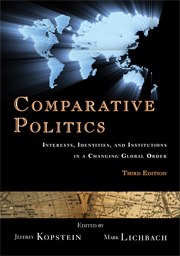Book contents
- Frontmatter
- Contents
- List of Maps
- Preface to the Third Edition
- List of Contributors
- 1 What Is Comparative Politics?
- 2 The Framework of Analysis
- PART ONE EARLY DEVELOPERS
- PART TWO MIDDLE DEVELOPERS
- PART THREE LATE DEVELOPERS
- PART FOUR EXPERIMENTAL DEVELOPERS
- 9 Mexico
- 10 India
- 11 Iran
- 12 South Africa
- 13 The European Union
- 14 Nigeria
- STOP AND COMPARE
- Index
- References
10 - India
from PART FOUR - EXPERIMENTAL DEVELOPERS
- Frontmatter
- Contents
- List of Maps
- Preface to the Third Edition
- List of Contributors
- 1 What Is Comparative Politics?
- 2 The Framework of Analysis
- PART ONE EARLY DEVELOPERS
- PART TWO MIDDLE DEVELOPERS
- PART THREE LATE DEVELOPERS
- PART FOUR EXPERIMENTAL DEVELOPERS
- 9 Mexico
- 10 India
- 11 Iran
- 12 South Africa
- 13 The European Union
- 14 Nigeria
- STOP AND COMPARE
- Index
- References
Summary
Introduction
For most of the first four decades after its independence in 1947, India was led by the Congress Party, which descended from the independence movement once led by Mohandas K. (Mahatma) Gandhi and was committed to a vision of a modern, industrialized, secular state. The party that led India into the twenty-first century, however, was the Bharatiya Janata Party (BJP, or the Indian People's Party), which descended from political and social organizations committed to redefining Indian national identity in terms of Hinduttva (Hindu culture and civilization). Under the leadership of the BJP, India held a series of underground nuclear tests in 1998 and proclaimed itself a member of the nuclear club, setting off joyous celebrations throughout the country and prompting rival Pakistan to launch its own nuclear tests. The following year, Indian troops ousted Pakistani-backed militants from Kargil in Indian-held Kashmir (the Himalayan region claimed by both India and Pakistan), spurring another round of celebrations accompanied by emotional tributes to the “Kargil martyrs.” Soon after, India's population passed the one billion mark, triggering still more national euphoria as India closed in on China for the dubious distinction of being the world's most populous country. Following the terrorist attacks of September 11, 2001, in the United States, given Al Qaeda's stated support for Muslim insurgents in Kashmir, India became a key player in the international war on terror, but it also reaffirmed its independent posture by refusing to join the U.S.-led coalition that invaded Iraq.
- Type
- Chapter
- Information
- Comparative PoliticsInterests, Identities, and Institutions in a Changing Global Order, pp. 366 - 417Publisher: Cambridge University PressPrint publication year: 2008

